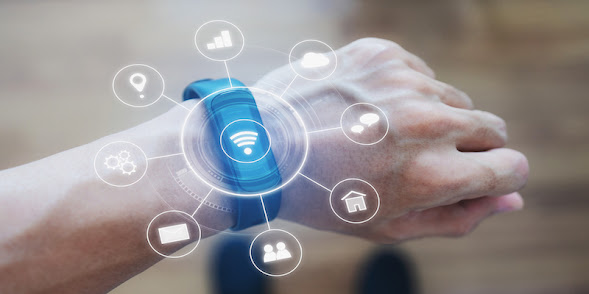''' STUDENTS ''
BIO-INTELLI-SENSE
'' TRACKERS '''
IT MAY HELP TRACE COVID - BUT IT always knows where you are.
Oakland University, a public research university near Detroit, is at the forefront of school and companies preparing to make the leap to the BioButton, a novel coin-size sensor attached to the skin 24/7 that uses algorithms to try to detect possible signs of the Covid-19.
''IT'S CHILLING THAT THESE INVASIVE AND UNPROVEN devices could become a condition for keeping our jobs, attending school or taking part in public life,'' said Albert Fox Cahn, an executive director of Surveillance Technology Oversight Project.
''Even worse, there's nothing to stop police or ICE from requiring schools and employers to hand over this data,'' he said, referring to the U.S. immigration and Customs Enforcement agency.
In Rochester, Mich., Oakland University is preparing to hand out wearable devices to students that log skin temperature once a minute - or more than 1,400 times per day -in the hopes of pinpointing early signs of the coronavirus.
STUDENTS ON UNIVERSITY OF TENNESSEE FOOTBALL TEAM TUCK proximity trackers under their shoulder pads during games - allowing the team's medical director to trace which players have spent more than 15 minutes near a team mate or an opposing player.
The powerful new surveillance system wearable devices that continuously monitor users, are the latest high-tech gadgets to emerge in the battle to hinder the coronavirus. Some sports leagues, factories and nursing homes have already deployed them.
Resorts are rushing to adopt them. A few schools are preparing to try them. And the conference industry is eyeing them as a potential tool to help reopen convention centers.
''Everyone is in early stages of this,'' said Laura Becker, a research manager focusing on employee experience at the International Data Corporation, a market research firm. ''If it works, the market could be huge, because everyone wants to get back to some sense of normalcy.''
Companies and industry analysts say that the wearable trackers fill an important gap in pandemic safety. Many employers and colleges have adopted virus screening tools like symptom-checking apps and temperature temperature scanning cameras.
But they are not designed to catch the estimated 40 percent of people with Covid-19 infections who may never develop symptoms like fevers.
Some offices have also adopted smartphone virus tracing apps that detect users' proximity. But the new wearable trackers serve a different audience; workplaces like factories where workers cannot take their phones, or sports teams whose athletes spend time close together.
Devices from Microshare, a workplace analytics company that makes proximity detection sensors, use Bluetooth technology to detect and log people wearing the trackers who come into close contact with one another for more than 10 or 15 minutes.
But the system does not continuously monitor users' locations, said Ron Rock, the chief executive of Microshare. And it uses ID codes, not employees' real names, to log close contacts.
Whether such continuous surveillance of students, a young and largely healthy population, is beneficial is not yet known. Researchers are only in the early phases of studying whether wearable technology could help flag the signs of the disease.
David. A. Stone, vice president for research at Oakland University, said school officials had carefully vetted the BioButton and concluded it was a low risk device added to measures like social distancing and mask wearing, might help hinder the spread of the virus.
The technology will alert campus health services to students with possible virus symptoms, he said, but the school will not receive specific data.
''In an ideal world, we would love to be able to wait until this is an F.D.A. approved diagnostic,'' Dr. Stone said. But, he added, ''nothing about this pandemic has been an ideal world.''
Dr. James Mault, chief executive of BioIntelliSense , the start-up behind the BioButton, said students with privacy concerns could ask to have their personal details stripped from the company's records.
He added that BioIntelliSense was preparing to conduct a large-scale study examining its system's effectiveness for Covid-19.
Oakland had already planned to require athletes and dorm residents to wear the BioButton. But the university reversed course this summer after nearly 2,500 students and staff members signed a petition objecting to the policy. The trackers will now be optional for students.
''A lot of colleges are doing masks and social distancing,'' said Tyler Dixon, a senior at the school who started the petition, ''but his seemed like one step too far.''
The Honor and Serving of the Latest Global Operational Research on State of The World, Tools, Technology and Students, continues. The World Students Society thanks author Natasha Singer.
With respectful dedication to the Students, Professors and Teachers of the world. See Ya all prepare and register for Great Global Elections on The World Students Society : wssciw.blogspot.com and Twitter - !E-WOW! - The Ecosystem 2011 :
''' Devices - Drapes '''
Good Night and God Bless

.png)


0 comments:
Post a Comment
Grace A Comment!